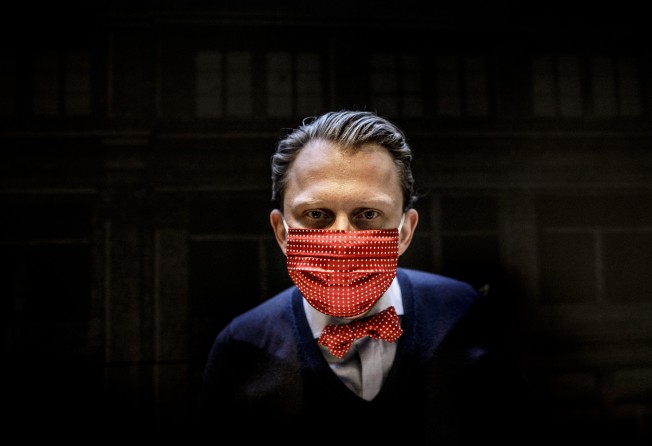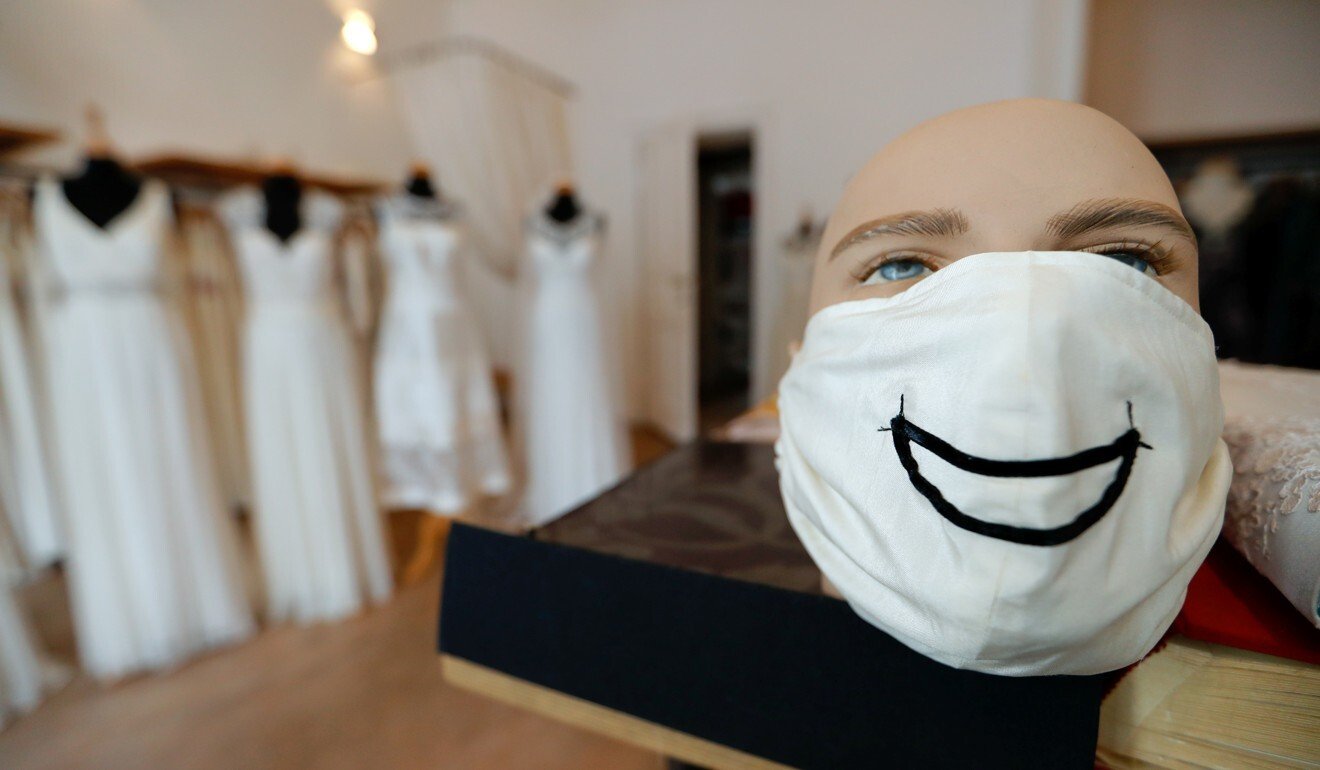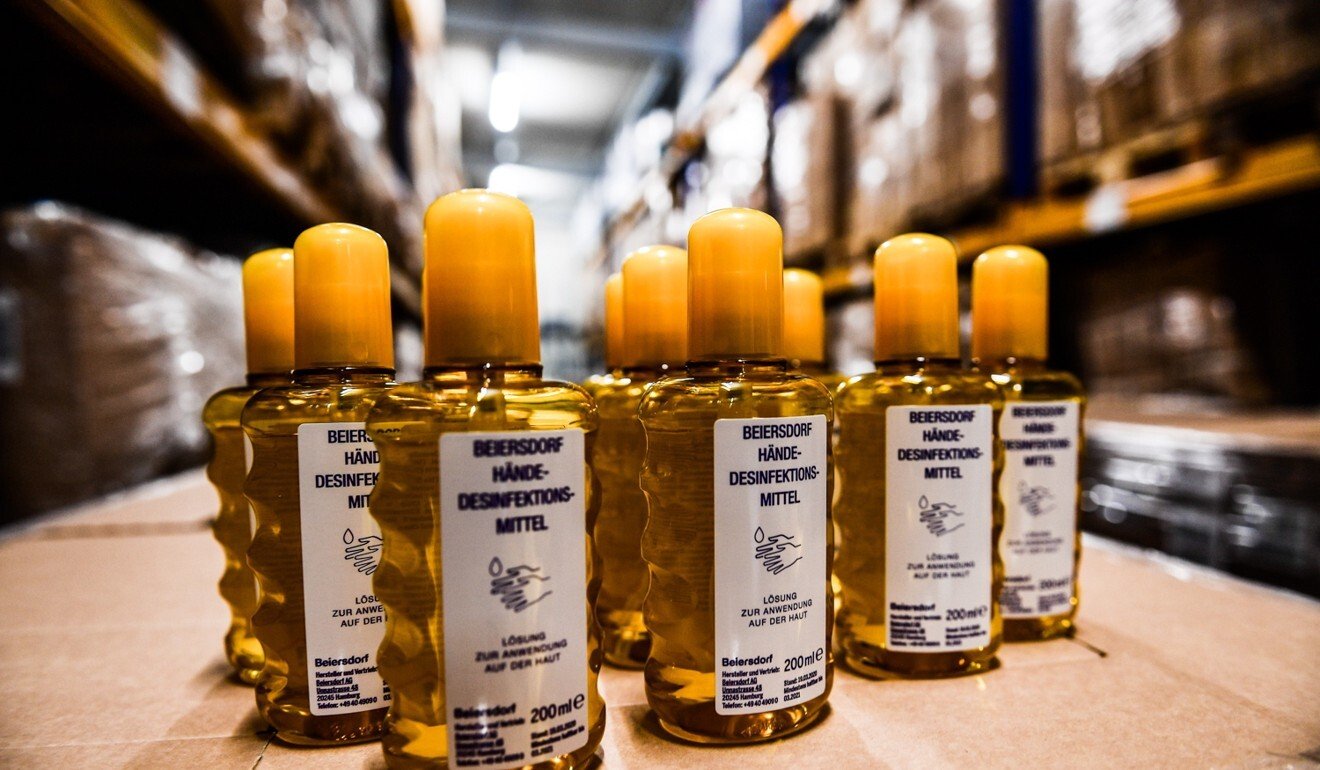Bow ties to face masks: German firms shift gears in coronavirus crisis
- Fashion companies retool plants and production lines to make face masks and medical equipment
- Beer brewers and spirits makers have made changes at their distilleries to produce or distribute grain alcohol for disinfectants

The Auerbach men’s accessories maker in Berlin has been sewing tailor-made neckties, elegant scarves and stylish handkerchiefs for more than a century. But with demand for its finely handcrafted wearable works of art in free fall due to the coronavirus crisis, managing director Jan-Henrik Scheper-Stuke realised he needed a quick fix to keep his 40 employees working.
Just a few days after abruptly shifting production from dapper bow ties to fancy face masks last Thursday, Auerbach has been inundated with more than 2,000 orders for his €18 (US$20) masks that come in a wide variety of colours and designs. Scheper-Stuke is now searching for tailors to help meet the surging demand so he can shorten the two-week order delivery time.
“Necessity is the mother of invention,” Scheper-Stuke said in an interview. “It seemed that neckties and bow ties weren’t going be in demand for the time being so the question was how could we best utilise our top-quality tailoring expertise? Switching to making masks seemed like a smart thing to do.”
Scheper-Stuke is one of a myriad German entrepreneurs to quickly shift gears in the face of the coronavirus crisis that has idled the country and much of the world. Other companies and even opera houses in Germany – one of the world’s hardest hit nations with 73,522 confirmed infections and 872 deaths (as of late Wednesday) have been innovative in coming up with remedies to some of the shortages the country is facing.
They have quickly retooled their plants and production lines to make face masks and medical equipment instead of shirts, jackets, seat covers and theatre costumes.
In a remarkable can-do spirit of national interest, beer brewers and spirits makers have made changes at their distilleries to produce or distribute grain alcohol that can be used for disinfectants that are in short supply.
With hospitals, doctors and government officials scouring high and low for the increasingly scarce medical surgical masks used to prevent infection in one of the hardest hit countries in the world, a growing number of Germans are now wearing simple anti-epidemic cloth masks that were invented in China more than a century ago and are considered markers of medical modernity across Asia to help prevent the wearer from spreading disease in public.
Once scoffed at by many or generally dismissed as ineffective by medical authorities in Europe, ordinary face masks in Germany are suddenly en vogue – an appreciable shift in thinking facilitated by decisions by Austria and the German city of Jena this week to require people to wear the simple face masks in public.
“People in Asia are far ahead of us when it comes to protecting others by wearing face masks,” said Scheper-Stuke. “Masks are suddenly in and it’s a good idea. I have to admit I was sceptical and used to think it was ridiculous for people to walk around wearing masks. I was wrong.”
Wearing face masks might not be a fashion statement everywhere in Germany. But more and more companies are getting into the act. A bridal gown maker in Berlin, Bianco Evento, announced last week it had stopped making wedding dresses and would produce 35,000 masks and 5,000 hospital lab coats per week instead for hospitals.
A car parts supplier in Bavaria, Zettl Automotive, said it had been asked by the local state government to shift its production from sewing car seats to face masks and hope to soon be able to produce a million of high-quality masks for hospitals.
Nearly 30 idled seamstresses and costume designers at Berlin’s prestigious Staatsoper Unter den Linden opera house responded to a call from the city government to sew together face masks – instead of stage costumes – last Tuesday. They are on target to have about 1,500 handsewn masks finished this week that will be donated to police stations, firefighters and senior residences.

“It’s a wonderful feeling to be part of a solution and just about everyone was happy to pitch in and help out,” said Isabel Theissen, the opera house’s deputy costume director, in an interview.
“It’s great that everyone rolled up their sleeves and we’re all pulling together in the same direction.”
At first all the opera’s cotton masks – which are washable and reusable – were white. But it has had to switch to other colours, creative patterns and even stripes after the white fabric ran out earlier this week.
Germany’s largest manufacturer of sports and leisure wear, Trigema, has also shifted its production. Wolfgang Grupp, the owner and chief executive of the company with 700 seamstresses, said in an interview that hospitals, nursing homes and local government officials approached him five weeks ago, asking if the company could supply masks.
“Naturally I said I’d be happy to help but had no idea that two weeks later we’d otherwise have to shut the whole company down so thanks to the masks we’re able to continue operating while helping others,” Grupp said. “We’re going to make about 25,000 masks this week for a total of about 120,000.”
The seamstresses are even volunteering to work extra Saturday shifts. Grupp believes that the crisis is highlighting one of the hidden advantages of Germany’s famous “Mittelstand” system of small- to medium-sized businesses.

“We’ve got a lot of innovative companies that are used to adapting quickly in order to stay ahead,” he said. “It’s definitely a national strength.”
In the face of a shortage of disinfectants, makers of alcoholic beverages have shifted part of their production to providing pure grain alcohol to pharmacies and hospitals. One hospital in Wolfenbuettel said that spirits producer Jaegermeister had donated 50,000 litres of alcohol.
In Berlin, the Schilken company that usually makes dry gin, brandy and a peppermint liqueur called Berliner Luft has been delivering about 10,000 litres of 96 proof alcohol each week to pharmacies in Berlin – and up to 60km away in 5-litre canisters. The pharmacies can use the alcohol to make disinfectant.
“We’ve got to try to figure out a way to get through this together,” said Patrick Mier, a managing director at Schilken. “No one knows how long it’s going to last. The pharmacies are extremely appreciative to get the alcohol and sales of our drinks has gone down sharply. So, for the moment this is working out well for everyone.”